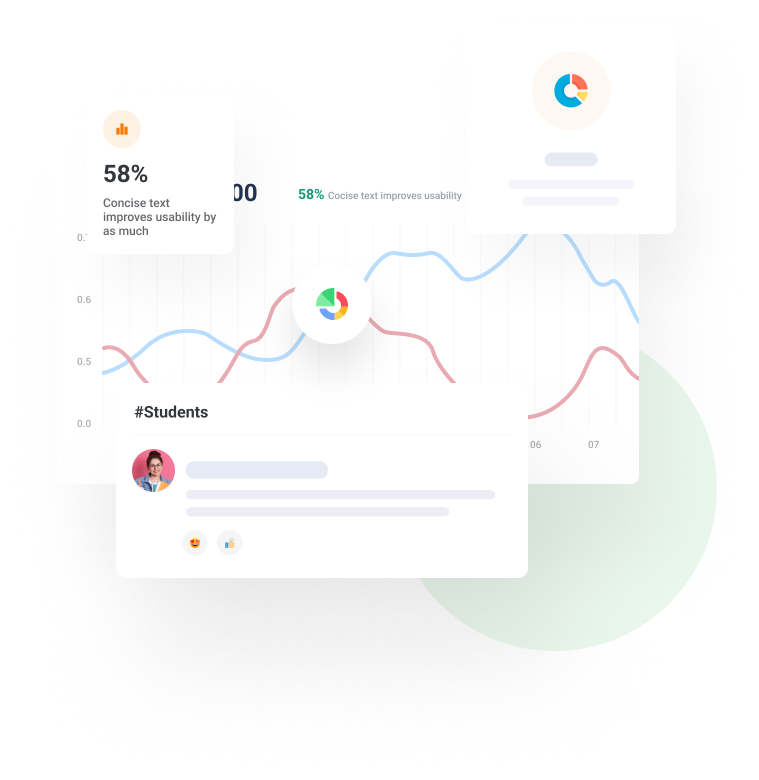A Guide to zyBooks Research
The story of zyBooks is the story of rigorous peer-reviewed research.
zyBooks was started a decade ago by computer science professors looking to reverse a disturbing trend in their field: A huge attrition rate among their students. They created a new kind of interactive textbook designed to keep students engaged—and enrolled.
This textbook relied on a groundbreaking “say, show, ask” pedagogy, and lived completely online. But how could the zyBooks team prove that their innovative books were more effective than traditional versions?
Research.
In their first research paper on the efficacy of their new approach, co-founder Dr. Frank Vahid and colleagues demonstrated concrete improvement in student performance on many fronts, especially for struggling students. That paper launched the growth of the then-new, web-native textbook.
Fast forward to today, and zyBooks is now applying its groundbreaking approach across many STEM disciplines, including computer science, data science, math and statistics, information technology and engineering. Along with the subject matter, research has expanded, too—and remains firmly baked into the company’s DNA.
To learn more about the how and why of zyBooks research, we spoke with our head of research, Dr. Chelsea Gordon, a specialist in cognitive science who studies how people learn. Here’s our conversation:
In this post
What is the motivation behind zyBooks research?
What types of research are you currently pursuing?
How do you work with academic collaborators?
Collaborating with zyBooks on research
What is the motivation behind zyBooks research?
Dr. Chelsea Gordon We’re evolving our products all the time, updating content and adding new tools. And we’re also adding more STEM disciplines. Research helps us measure these efforts in a number of ways: First, we do research to determine and share the efficacy of zyBooks products and tools. We do research to improve the content and user experience. And we use research to evaluate the impact of introducing new tools, content and disciplines.
We strongly believe that research is the cornerstone of the educational products we create.
What types of research are you currently pursuing?
Efficacy Studies
Dr. Chelsea Gordon Efficacy studies are foundational for zyBooks. With these types of research we ask questions like: Does switching to a zyBook improve student grades? Does introducing new tools or content into a zyBook improve student outcomes and reduce student struggle? Does completing the participation and challenge activities in the zyBook improve learning?
These studies help us identify how we’re helping students learn, both to provide evidence to the instructor community and to help us improve the product. And we look at how well our products reduce stress and anxiety around a subject, especially for math-related disciplines, which are known to cause that.
zyBooks Efficacy Studies
Self-Efficacy Studies
Another side of efficacy that we study is self-efficacy; in other words, looking at the belief students have in their ability to excel, and how zyBooks contributes to that.
Struggle Research
Can we identify when students are struggling and what they are struggling with? How much struggle is productive before it becomes self-defeating? These are the kind of questions we ask in our struggle research.
zyBooks Struggle Research
Student Earnestness
We study how much effort students are actually putting in to try to learn a subject. We look at different aspects, from how much time students spend on their work to how many responses they actually attempt in their zyBooks. Earnestness also gives us insight into the propensity for cheating.
zyBooks Student Earnestness Research
How do you work with academic collaborators?
Dr. Chelsea Gordon Our researchers are consumers, facilitators, and conductors of educational research. We often collaborate with instructors, researchers, and department heads to both help facilitate and design, and conduct peer-reviewed research studies. Our goals are to share insights on what we encounter about student learning, and to improve the quality of our zyBooks. If you’re interested in collaborating, please reach out to us at research@zybooks.com.
Collaborating with zyBooks on Research
We have a robust slate of new research planned for the coming school year and we’re looking for academic collaborators to partner with us. If you answer “yes” to any of these questions, we’d love to speak with you.
- Have you conducted your own research using zyBooks in a course and would like to share or discuss that research with us, or even extend that research with additional behavioral data that we can provide to you?
- Do you want to learn more about research that we’ve published or are currently working on?
- Do you want to be a low-effort collaborator in research efforts (i.e., distribute surveys to your students)?
- Do you want to be involved in large-scale efficacy studies by sharing your grade distribution or retention data before/after switching to using zyBooks to help determine impact across disciplines?
- Do you want to design and conduct collaborative research studies together in one of various interest areas (integrity, self-efficacy, student attitudes and perceptions, or others)?
Please contact us at research@zybooks.com.









